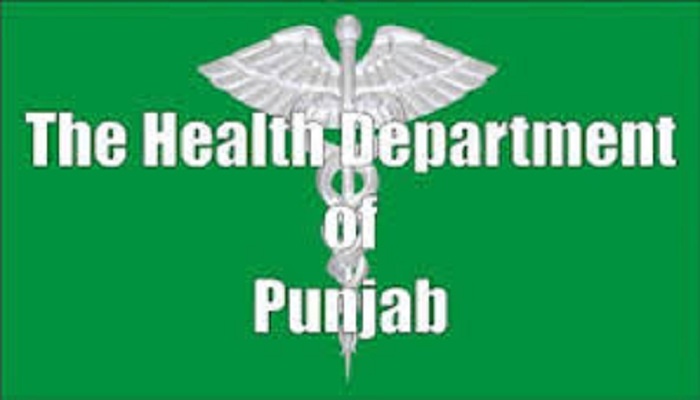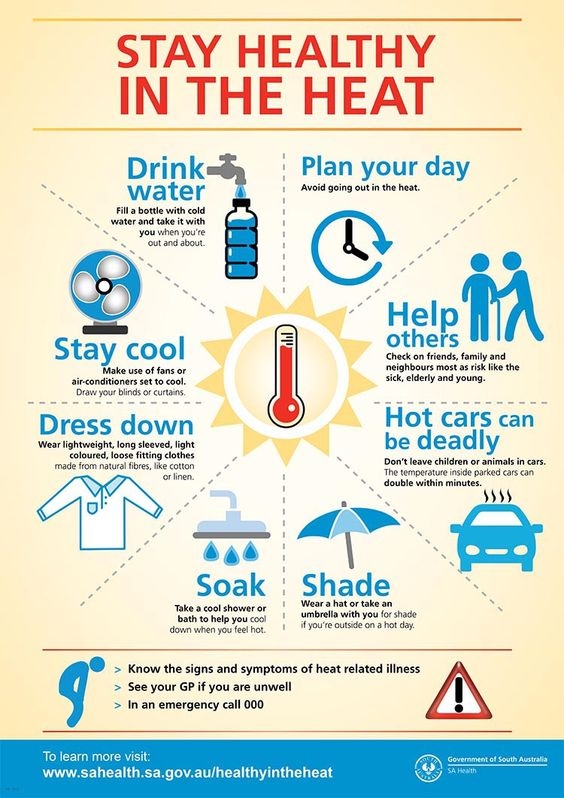Rising Temperatures: Health Department Issues Important Heat Advisory

Table of Contents
Understanding the Dangers of Extreme Heat
Extreme heat significantly impacts the body's ability to regulate its temperature, leading to various heat-related illnesses. Understanding these dangers is the first step in staying safe.
Heatstroke: A Life-Threatening Condition
Heatstroke is a medical emergency resulting from the body overheating. It's the most serious heat-related illness and can be fatal if not treated promptly.
- Symptoms of Heatstroke: High body temperature (above 103°F or 39.4°C), confusion, seizures, loss of consciousness, rapid breathing, and strong pulse.
- Severity and Fatality: Heatstroke can cause organ damage and death if not treated immediately. Delaying treatment significantly increases the risk of long-term health problems or fatality.
- Seeking Immediate Medical Attention: If you suspect someone is experiencing heatstroke, call emergency services immediately (911 or your local emergency number). Get them to a cool place and begin cooling them down while waiting for help.
Heat Exhaustion: Recognizing the Warning Signs
Heat exhaustion is a less severe but still serious condition that often precedes heatstroke. Recognizing the warning signs is vital to prevent it from escalating.
- Symptoms of Heat Exhaustion: Heavy sweating, weakness, dizziness, headache, nausea, vomiting, muscle cramps, and faintness.
- Precursor to Heatstroke: Heat exhaustion is a clear warning sign that your body is struggling with the heat. Ignoring these symptoms can lead to heatstroke.
- Action to Take: If you experience symptoms of heat exhaustion, move to a cool place, rest, drink plenty of fluids (water is best), and loosen any tight clothing. If symptoms persist or worsen, seek medical attention.
Vulnerable Populations at Increased Risk
Certain groups are more vulnerable to heat-related illnesses due to pre-existing health conditions or age.
- High-Risk Groups: The elderly, infants and young children, people with chronic illnesses (heart disease, respiratory problems, diabetes), individuals taking certain medications, and those who are overweight or obese are at increased risk.
- Increased Susceptibility: These groups may have a reduced ability to regulate their body temperature or may be less able to recognize and respond to the symptoms of heat illness.
- Specific Recommendations: Check on elderly neighbors and relatives regularly, ensure infants and children are kept cool and hydrated, and make sure individuals with chronic illnesses are following their doctor's recommendations for managing heat.
Protecting Yourself from Extreme Heat
Staying safe during a heat wave requires proactive steps to protect yourself from the extreme heat.
Staying Hydrated is Crucial
Hydration is paramount during periods of rising temperatures.
- Drink Plenty of Water: Drink plenty of water throughout the day, even before you feel thirsty. Your thirst mechanism may not always be accurate.
- Avoid Dehydrating Drinks: Limit sugary drinks and alcohol, as they can actually dehydrate you.
- Carry a Water Bottle: Keep a reusable water bottle with you at all times and refill it regularly.
Seeking Shade and Limiting Outdoor Activity
Minimizing exposure to direct sunlight is key to preventing heat-related illnesses.
- Limit Strenuous Activity: Avoid strenuous outdoor activities during the hottest part of the day (typically between 10 a.m. and 4 p.m.).
- Schedule Activities Wisely: Plan outdoor activities for the cooler parts of the day, such as early morning or evening.
- Find Shade: Seek shade whenever possible when you are outdoors.
Appropriate Clothing and Sun Protection
The right clothing choices can make a significant difference in your comfort and safety.
- Lightweight Clothing: Wear lightweight, light-colored, and loose-fitting clothing to allow for better ventilation.
- High SPF Sunscreen: Use a broad-spectrum sunscreen with an SPF of 30 or higher and reapply every two hours.
- Wide-Brimmed Hat: Wear a wide-brimmed hat to protect your face, neck, and ears from the sun.
Resources and Further Information
For more information and assistance, please utilize these resources:
- CDC Website: [Link to CDC heat safety website]
- Local Health Department: [Link to your local health department website]
- Emergency Contact: 911 (or your local emergency number)
- Cooling Centers: [List locations of any cooling centers in your area, if applicable]
Conclusion
The rising temperatures and this urgent heat advisory necessitate immediate action to protect yourself and your loved ones. By understanding the dangers of extreme heat, taking preventative measures like staying hydrated, limiting outdoor activity, seeking shade, and knowing when to seek medical help, you can significantly reduce your risk of heat-related illness. Remember to check on vulnerable individuals in your community and stay informed about the ongoing heat advisory. Stay safe and stay cool during these rising temperatures. For more information on heat safety and resources, visit [link to relevant website]. Let's work together to ensure the safety of our community during this heat wave.

Featured Posts
-
 Pregnant Cassie Announces Third Babys Gender On Alex Fines Birthday
May 13, 2025
Pregnant Cassie Announces Third Babys Gender On Alex Fines Birthday
May 13, 2025 -
 V Moskve Proydet Rossiysko Myanmanskiy Delovoy Forum Klyuchevye Sobytiya I Uchastniki
May 13, 2025
V Moskve Proydet Rossiysko Myanmanskiy Delovoy Forum Klyuchevye Sobytiya I Uchastniki
May 13, 2025 -
 Sabalenka Falls To Ostapenko In Stuttgart Open Final
May 13, 2025
Sabalenka Falls To Ostapenko In Stuttgart Open Final
May 13, 2025 -
 Avna Osuda Uni A Roma Srbi E Protiv Antiromskikh Stavova Marinike Tepi
May 13, 2025
Avna Osuda Uni A Roma Srbi E Protiv Antiromskikh Stavova Marinike Tepi
May 13, 2025 -
 Heatwave Warning Centre Urges States To Take Precautions
May 13, 2025
Heatwave Warning Centre Urges States To Take Precautions
May 13, 2025
Latest Posts
-
 Flushed Away A Review Of The Animated Classic
May 13, 2025
Flushed Away A Review Of The Animated Classic
May 13, 2025 -
 Nba Draft Lottery 2024 Espns Updated Coverage Format
May 13, 2025
Nba Draft Lottery 2024 Espns Updated Coverage Format
May 13, 2025 -
 Sir Ian Mc Kellens Early Coronation Street Appearance A Stepping Stone To Success
May 13, 2025
Sir Ian Mc Kellens Early Coronation Street Appearance A Stepping Stone To Success
May 13, 2025 -
 Analyzing Espns Changes To Its Nba Draft Lottery Programming
May 13, 2025
Analyzing Espns Changes To Its Nba Draft Lottery Programming
May 13, 2025 -
 Sir Ian Mc Kellens Forgotten Coronation Street Role The Unexpected Cameo That Launched A Career
May 13, 2025
Sir Ian Mc Kellens Forgotten Coronation Street Role The Unexpected Cameo That Launched A Career
May 13, 2025
